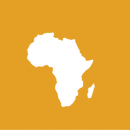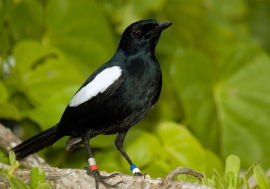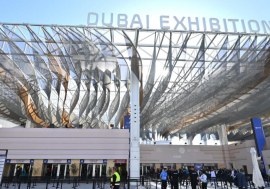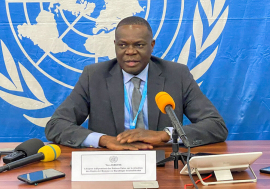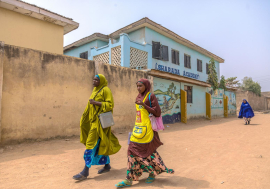Africa Watch
On a visit to Africa’s Great Lakes region, Council urges break with past
By André-Michel Essoungou
Five months after United Nations Secretary-General Ban Ki-moon and World Bank President Jim Yong Kim visited Africa’s Great Lakes region, a 15-member delegation of the UN Security Council followed suit. The delegation travelled to the region from 4 to 8 October and met with political leaders and local activists, displaced persons and refugees, as well as UN peacekeepers and diplomats.
The visit was an attempt by the Council to get a better grasp of the complexities of a region where instability has persisted over the past two decades, with a new peak in fighting seen in recent months. Since April 2012 and the creation of the March 23 armed movement (known as the M23), renewed fighting has forced up to 2 million people to flee their homes, mainly in the eastern region of the Democratic Republic of the Congo (DRC).
The visit came three years after another Council trip to the same region that had modest ambitions: just a two-country visit to the DRC and Uganda. This time, however, after stops in these two countries, the delegation went on to Rwanda before heading farther east to Ethiopia, which hosts the African Union headquarters.
The Council’s busy agenda was an acknowledgement that a solution to the persisting instability in the Great Lakes region requires the active engagement and the commitment of key regional actors. On various occasions over the past years, the Council has indeed urged countries of the region to find a peaceful solution to the instability plaguing the DRC, mainly in the east. The latest such calls came shortly after the M23 armed group—allegedly supported by Rwanda, though Rwanda strongly denies this—took up arms against the DRC government, plunging the region into one of its worst episodes of instability in recent years. The M23 rebels were expected to sign a peace deal with the government in November after suffering defeats at the hands of government forces backed by a 3,000-strong UN intervention brigade.
In response, two political processes were initiated: a wide-ranging peace and security agreement among the countries of the region (DRC, Angola, Burundi, Central African Republic, Republic of Congo, Rwanda, South Africa, South Sudan, Tanzania, Uganda and Zambia), and peace talks in Kampala, Uganda’s capital, between the DRC government and M23 leaders.
During its visit the Council delegation was updated by regional leaders on the implementation of the agreement, and on the progress of the peace talks. On both issues the Council urged the leaders not to repeat the mistakes of the past. Unlike previous agreements, this one must be followed by action, it reportedly told presidents Joseph Kabila of the DRC, Paul Kagame of Rwanda and Yoweri Museveni of Uganda.
On the Kampala talks, speaking to the press in Kinshasa on behalf of the delegation, the Security Council representatives of Morocco and France insisted that the past provides clear lessons about the consequences of integrating armed groups into national armies without rigorous vetting. They warned against repeating such mistakes. In the Council’s view, they added, there could be no compromise on fighting impunity—no amnesty should be granted to M23 members who have committed serious crimes.
On the last leg of their visit, the Council members visited the African Union headquarters in Addis Ababa. In addition to addressing the situation in the Great Lakes region, they held discussions with AU officials on a wide range of issues related to peace and security in Africa.
Oil politics heats up in Liberia
By Kingsley Ighobor
When Liberia’s 14-year civil war was ending 10 years ago, citizens desperately wanted to live in a country where children could go to school safely, women were not molested, traders travelled between cities, and so on. Today, with those goals mostly met, the country faces another challenge: that of managing its abundant natural resources, particularly oil that was discovered in 2012.
With an impressive GDP growth of 10.8% in 2012, according to the World Bank, the oil discovery has triggered both excitement and fear. While oil could potentially accelerate the country’s development, Liberians also remember that mismanagement of its forestry, gold and diamonds resources was one of the causes of the last war. Therefore, they advise that all excitement be curtailed while the right policies are set.
It didn’t seem like the Liberian Senate heeded such advice when it swiftly passed two oil bills in September: the first bill defined the role of the National Oil Company of Liberia (NOCAL) as a commercial entity and the second set the regulatory policies. But the bills hit a brick wall in the lower legislative chamber, the House of Representatives, where members raised alarm over the lack of extensive consultations with citizens before passage in the Senate.
The House members’ cautious approach appears in line with public thinking. Almost unanimously, Liberian civil society groups opposed the bills and criticised Mr. Robert Sirleaf, head of NOCAL and son of President Ellen Johnson Sirleaf, for lobbying senators to pass the two pieces of legislation.
Silas Siakor, head of the Sustainable Development Institute, a Liberian NGO that promotes judicious exploitation of natural resources, criticised Mr. Sirleaf for not consulting widely. “They [Mr. Sirleaf and his NOCAL colleagues] were totally opposed to the idea of any kind of citizen input [to the bill].” Under pressure, Mr. Sirleaf resigned both his position as head of NOCAL and as an adviser to the President, claiming that he had completed his mandate to reform the oil sector.
The House members and the civil society groups believe they have at least won the battle to have government open up the process of drafting the oil legislation. On its part, the government launched a nationwide public awareness campaign to explain the details in the bills. A key contention in one of the bills is over an allocation of 5% of oil proceeds to Liberians’ social welfare. During the campaign in Saniquellie, Nimba County, citizens demanded that such an allocation should be at least 10% of the proceeds.
They also rejected the president’s powers to appoint NOCAL board members, preferring the legislature to exercise such powers. They insisted that prospective oil companies be made to establish an oil refinery in the country to create jobs for Liberians.
Analysts believe that after the initial storm, the government will likely make changes to the legislation to accommodate the citizens’ concerns. Global Witness, a watchdog group that campaigns against natural resource-related conflicts and corruption, says Liberia needs the right policies and could very well set them. The Liberian oil sector could potentially be “one of the best-run and best-governed sectors on the continent, if not in the world, in terms of developing countries with new oil finds,” says Chloe Fussel, a campaigner for the organization.

